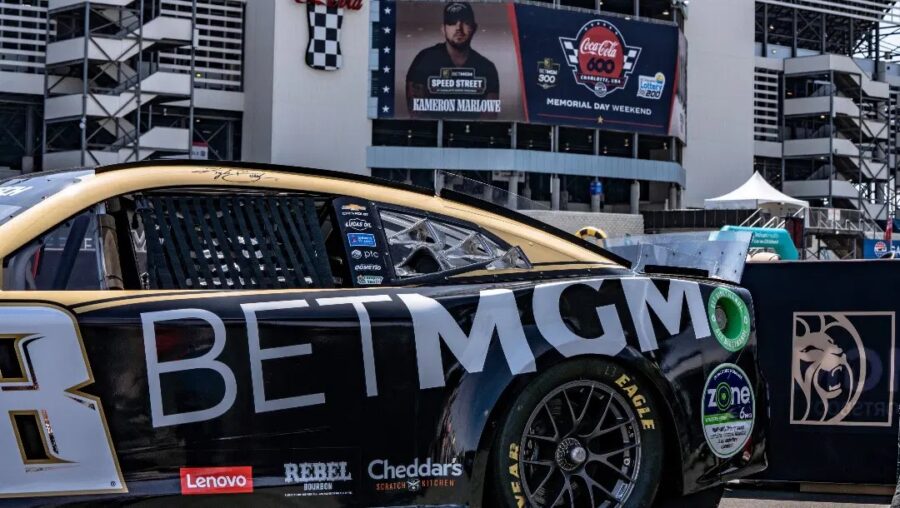BetMGM swears off prediction markets in earnings call

BetMGM “sits on significant excess cash,” Chief Executive Adam Greenblatt said at the outset of an October 14 third-quarter-earnings call with Wall Street analysts.
To that end, the company was returning a first-ever, US$200 million distribution to parents MGM Resorts International and Entain. Greenblatt called this “a new era for our shareholders.”
The remaining US$100 million in cash on hand, the Chief Executive said, would be “the targeted minimum cash for the time being.” BetMGM’s US$150 million line of credit remains undrawn.
Queried whether US$100 million would be enough to keep in the till, Chief Financial Officer Gary Deutsch assured analysts that it would and that BetMGM had gotten by with less in the past.
“We could withhold dividends if there was a growth opportunity we needed to pursue,” he added. “If we need it, we have it.”
Year to date, according to Greenblatt, BetMGM’s revenue had grown 30%, growth that had eased slightly from 2024. “Our performance was underpinned by our disciplined approach to acquiring players,” emphasizing premium-mass ones, he continued.
“Sports results were slightly higher in July and August,” Greenblatt said, enabling a 10.1 hold percentage. This offset adverse results early in the NFL season.
“Our app is much faster and is more stable than ever before,” continued the Chief Executive, adding that single-game parlays were now online. Players could more easily track their points and performance, he continued.
iGaming “maintained its strong growth” for the company. That performance, Greenblatt said, “is driven by new, exclusive and best-in-class content.”
He said he was encouraged that the average value of players was higher, contrary to his expectations. “The depth of the igaming market continues to impress,” Greenblatt stated, warning of tougher comparisons ahead.
“It’s counterintuitive as you go deeper into the market,” he continued. “The market is just so fabulously deep and I can’t tell you where that ends. There’s no shallowing of the water.”
“All signs are fabulously successful,” Greenblatt said of the launch of four Price Is Right-branded games. BetMGM also incepted games tied to three NFL teams: the Detroit Lions, Philadelphia Eagles and Pittsburgh Steelers.
Greenblatt asserted that there was “good” propulsion going into the fourth quarter. He expected BetMGM to go live in Missouri in December. In Canada, the debut of igaming and sports wagering in Alberta is anticipated to happen in mid-2026, but Greenblatt predicted that BetMGM would be “the biggest game in town.”
Of September sports wagering hold, Deutsch said BetMGM didn’t suffer as badly as its rivals in terms of adverse football results.
“It was not great but it was not impactful in the longer term,” and October has been better, Deutsch allowed.
“When 7.5-point dogs come out and win, it’s good for the sector,” added his Chief Executive.
“Our position is clear,” Greenblatt said regarding a surge in focus on prediction markets. “As the law stands today, sports predictions markets are — in essence — illegal sports betting,” without consumer protections or state gaming taxes.
“Just follow the data,” Greenblatt replied, when asked about the effect of prediction-market betting. Handle trends show no signs of degradation, “which, if the prediction markets were having an impact, we would have seen.” Prediction-market growth, he added, is coming from states where sports betting is not offered.
Greenblatt averred that BetMGM found itself in a Catch-22 situation where prediction markets were concerned.
“BetMGM is not going to put itself on the wrong side of our regulators,” who are against the exchanges. “We think this is not good for the integrity of sports, our players, our states,” Greenblatt said of the markets. “When you get into multi-leg parlays, I struggle to see the underlying economic impact being swapped. We shouldn’t be having this conversation.”
The Chief Executive continued, “we received letters from a number of our state regulators where they’ve made their perspective very clear,” including raising the prospect of license revocation should BetMGM dabble in prediction markets. “We take that very seriously.” This was followed up by conversations in Las Vegas at Global Gaming Expo and “without fail, the pattern is consistent.”
Allowing for the relevance of the discussion with regard to state-level revenues, Greenblatt said BetMGM’s top targets for broadening online sports betting were probably Alabama and Nebraska, along with Mississippi, Minnesota and Georgia.
As for wider igaming, the Chief Executive remarked that targets of opportunity in the past had been Maryland, New York and Illinois. However, in search of a favorable tax rate he was focusing on Virginia, Indiana and Washington, D.C.
David McKee is an award-winning journalist who has three decades of experience covering the gaming industry.
Verticals:
Sectors:
Topics:
Dig Deeper
The Backstory
Why the industry’s pivot points matter now
Online gambling operators are entering a new phase defined by disciplined cash use, sharper regulatory lines and a widening debate over responsibility standards. The backdrop: major U.S. brands are signaling confidence in igaming growth while sidestepping emerging offerings they say fall outside the law, all as policymakers scrutinize taxes and consumer protections at home and abroad. The stakes run from near-term margins to long-term licenses.
BetMGM set the tone by telling investors it “sits on significant excess cash” and returning a first-ever $200 million distribution to its parents, even as it pledged to keep regulators onside. CEO Adam Greenblatt’s Oct. 14 remarks underscored that message, including a hard no on prediction markets that he said amount to illegal sports betting without state protections. He also touted a faster app, stronger single-game parlay mechanics and a push into branded content to support hold and player value. For detail on that pivot and its regulatory read, see BetMGM’s comments in its third-quarter earnings call.
The signal from rivals has been more calibrated but points in the same direction: growth via product and igaming depth, not gray-area wagers. Flutter executives told Wall Street they’re watching prediction markets but view them as thinner than a full sportsbook, highlighting product-led engagement like YourWay parlays instead. That tension with analysts, along with expected Missouri and Alberta launch costs, set up a year of investment trade-offs. Their exchange is summarized in Flutter’s fourth-quarter call.
Cash-rich, product-heavy and selective on risk
The current earnings cadence shows operators prioritizing durable revenue over top-line handle. BetMGM touted a 10.1 hold in the summer months and a deeper igaming bench to counter early NFL swings, while emphasizing premium-mass acquisition and exclusive content, including game tie-ins with three NFL teams. The company is positioning for a Missouri debut by December and is bullish on an Alberta rollout it thinks could make it “the biggest game in town,” according to its latest call.
Flutter struck a similar tone, telling analysts it doesn’t “obsess about handle” and prefers margin quality, even after FanDuel-unfavorable NFL outcomes. It flagged a pipeline of new product and steady parlay adoption, with YourWay reaching a five percent penetration at the Super Bowl and a quarter of users placing more than 10 legs. While refusing granular hold guidance, Flutter said the business began 2025 well and remains on track with earlier targets, as noted in its call.
Rush Street underlined the same pivot with record revenue, profitability and margins, concentrated igaming growth across the U.S. and Latin America, and a multistate poker launch. Management called returns from igaming “really, really strong,” citing marketing efficiency and content upgrades like a unified lobby and expanded live-dealer focus. That performance arrived without new state entries since December 2023, according to Rush Street’s earnings remarks.
Prediction markets draw a line regulators won’t cross
The most immediate flashpoint is prediction markets, which operators say complicate compliance without meaningfully benefiting their core model. BetMGM’s Greenblatt told investors the company received letters from multiple state regulators warning that dabbling in such markets could risk license revocation, reinforcing his view that as law stands they are illegal sports betting sans protections or taxes. He added that handle trends show no degradation where legal betting already exists, with growth in prediction markets largely in states lacking sportsbooks. Those details are in BetMGM’s call.
Flutter was more equivocal, calling the space “interesting” but less rich than a sportsbook. Rush Street went further, arguing that if prediction markets erode state sports-tax bases, policymakers could respond by authorizing more igaming, which would favor casino-led operators. That contrarian view, and the firm’s confidence in casino-first economics, is laid out in Rush Street’s discussion with analysts.
The regulatory ground is also shifting at the federal level. Industry compliance voices are pushing for national tools such as a digital self-exclusion list that would close cross-border gaps in the current state-by-state approach. They caution that rapid product releases challenge regulators’ ability to keep pace and urge Congress and the Justice Department to set policies for unregulated online offerings while leaving advertising and licensing oversight with states. The argument is summarized in a recent responsible gaming webinar.
Taxes, expansion math and where operators deploy capital
Tax headwinds are forcing tighter calculus on where to launch and how quickly to scale. Flutter quantified a $50 million impact from Illinois’ tax increase, with plans to claw back roughly half this year, and projected $80 million in losses tied to Missouri and the balance to Alberta as it ramps. It also expects a $100 million cash flow hit penetrating Brazil, a legacy market with entrenched providers, per its call.
BetMGM, meanwhile, highlighted past targets like Maryland, New York and Illinois for broader igaming but is now emphasizing jurisdictions with more favorable rates, naming Virginia, Indiana and Washington, D.C., in its latest briefing. The operator also projected improved profitability, after reporting momentum in the fourth quarter and a path to breakeven on a normalized basis, as outlined in MGM’s recent financial update.
Rush Street is preparing for potential shifts in Colombia, where it is absorbing a value-added tax for players and betting that courts or lawmakers may shorten or end the levy. The company says liquidity will go first to new igaming states when openings appear, reinforcing the industrywide view that regulated online casino returns outperform. That stance is described in its earnings conversation.
Global context: local voices reshape the rulebook
While U.S. operators calibrate to state taxes and federal discussions on responsible gaming, regulators abroad are weighing social impacts alongside market openings. In New Zealand, tribal leaders urged a pause on the government’s plan to auction 15 online casino licenses, warning that offshore winners could undermine community safeguards and disproportionately harm Maori families. Officials say licensees would pay problem-gambling levies and the public will have its say during Parliament’s process. The debate underscores how stakeholder pressure can alter timelines and frameworks, as detailed in the call for a licensing pause.
The thread running through these developments is consistent: operators are channeling capital toward proven, regulated verticals; regulators are asserting clearer boundaries around novel wagering; and communities are demanding stronger safeguards as digital betting advances. How those forces reconcile will shape product road maps, tax policy and the pace of market entries in the months ahead.
For now, sportsbooks are leaning on product depth, parlay engagement and igaming scale to offset volatility. The industry’s next leg depends on whether lawmakers expand online casino access, how firmly they define the edges of prediction markets and which jurisdictions balance tax revenue with a stable operating environment.







